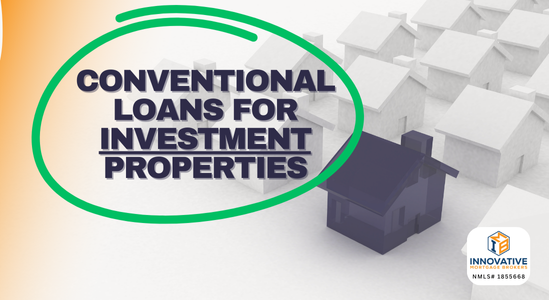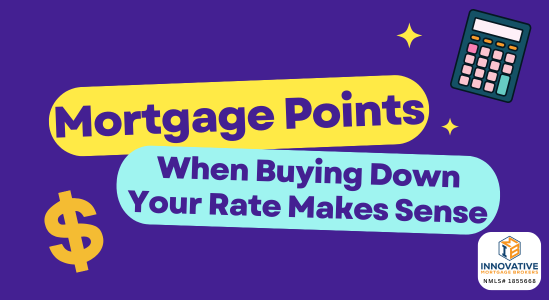How buying down your rate works, when it pays, and when to skip it Paying…
Conventional Loans for Investment Properties
Financing Your Next Investment Property: What You Need to Know
Investing in real estate can be a smart and rewarding way to build long-term wealth. Whether you’re new to real estate investing or already have a few properties under your belt, choosing the right mortgage is often a crucial first step. While there are many financing options available, conventional loans remain a tried-and-true path for many investors. In this article, we’ll explore the ins and outs of conventional loans for investment properties and discuss why can be a game-changer when you’re looking to build your real estate portfolio.
What Is a Conventional Loan?
A conventional loan is a mortgage not backed by any government program like the Federal Housing Administration (FHA), Veterans Affairs (VA), or the U.S. Department of Agriculture (USDA). Instead, these loans often conform to guidelines set by Fannie Mae and Freddie Mac, which helps maintain a degree of consistency across the mortgage market. The flexibility, competitive pricing, and widespread availability of conventional loans have made them a go-to choice for homeowners and investors alike.
Key Characteristics of Conventional Loans
- Not government-insured (unlike FHA or VA)
- Typically require stronger credit and financial profiles
- Can be used to purchase different types of residential properties (1–4 units)
- Offer flexible terms, usually with both fixed-rate and adjustable-rate options
While conventional loans may be most commonly associated with primary residences, they’re also widely used for investment properties. Investors appreciate that conventional financing often provides predictable monthly payments, and the qualification standards can be more streamlined than some alternative options.
Why Consider a Conventional Loan for Investment Properties?
- Flexibility in Property Types – Conventional loans can be used for single-family homes, duplexes, triplexes, or even four-unit properties. This versatility is invaluable if you’re planning to expand your portfolio across different property types, whether you’re aiming for traditional long-term rentals or short-term vacation rentals.
- Competitive Rates – Conventional loans tend to offer competitive interest rates, which can significantly affect your cash flow and overall return on investment. A few basis points can make a difference in how much profit you pocket each month—particularly for investment properties you plan to hold long-term.
- Higher Loan Limits – Certain areas allow for higher loan limits based on local property values. If you’re investing in a region with pricier real estate, these increased limits can help you finance a more expensive property without needing multiple loans.
- Building Wealth Through Equity – By financing with a conventional loan, you have the chance to build equity over time. Every mortgage payment you make helps you chip away at the principal balance, and if property values rise, you can enjoy additional equity gains. This can be particularly appealing if you have a longer investment horizon.
Qualifying for a Conventional Loan as an Investor
It’s essential to understand that qualifying for a conventional loan on an investment property can be more stringent than for a primary residence. Here are a few major factors lenders evaluate:
- Credit Score – Conventional mortgages generally require a higher credit score than government-backed options. A score of around 660–700 or better puts you in a strong position to access more favorable terms. However, there may be some flexibility for lower scores if you meet other criteria (like a larger down payment).
- Down Payment – Unlike certain primary residence loans that allow low or even zero down payments, investment properties typically require more skin in the game. A 20–25% down payment is not unusual for conventional investor financing. Although that can be a hefty upfront cost, it often leads to stronger loan terms and better monthly cash flow.
- Debt-to-Income (DTI) Ratio – Lenders look at how much of your income goes toward monthly debt obligations (including other mortgages, car loans, credit cards, etc.). A DTI ratio at or below 50% is often required.
- Cash Reserves – Investing comes with added risk for lenders. As a result, many lenders require you to have a certain amount of cash reserves—often anywhere from 2 to 6 months’ worth of mortgage payments for each property—to ensure you can cover potential vacancies or unforeseen expenses.
- Property Appraisal and Condition – Lenders want to be confident in the value and condition of the property. A thorough appraisal will be required, and the property must meet certain guidelines. If it needs major repairs or has significant issues, you may have to resolve them before closing.
How We Can Help
At Innovative Mortgage Brokers, we believe that your mortgage should align with your long-term goals, and we know that every investor’s situation is unique. That’s why we work with 30+ lenders, giving us access to an wide range of loan programs to suit your needs—especially if a conventional loan isn’t the best match.
- Diverse Lending Network – By partnering with various lenders, we can compare multiple products and help identify the one that offers the most favorable terms for your financial profile. This is particularly important if you’re juggling multiple properties or have a complex financial situation.
- Customized Guidance – We understand that real estate investing can be both thrilling and nerve-wracking. Our role is not just to help you secure a loan, but to advise you on which financing solutions might fit best for your short-term objectives and long-term wealth-building strategies.
- Local Expertise in PA and FL – Real estate markets in Pennsylvania (PA) and Florida (FL) have distinct nuances. We stay up to date on local trends, property regulations, and lender guidelines, so you can feel confident that your mortgage strategy is anchored in current, accurate information.
- Streamlined Process – Securing financing for an investment property often means dealing with a lot of moving parts—documentation, appraisals, insurance, and more. We coordinate these components for you, helping to ensure a smoother closing experience.
Investing in Pennsylvania (PA) and Florida (FL)
Pennsylvania offers a diverse market, blending stable urban centers with more rural communities. Cities like Philadelphia and Pittsburgh can be attractive for rental properties given their vibrant job markets and affordable cost of living. Meanwhile, smaller towns in PA can also offer steady rental demand without the intense competition of major metros.
Florida, on the other hand, is known for its year-round sunshine, growing population, and significant tourism industry. Whether you’re investing in a condo near the beach, a single-family home in the suburbs, or a multi-unit property in a thriving city like Orlando, the range of opportunities is immense. Vacation rentals are especially popular in many parts of Florida, but you’ll want to understand local ordinances and any homeowner association (HOA) rules that might affect your plans.
Making the Right Move
Selecting a conventional loan for your investment property can be a strategic step toward achieving your real estate goals. The key is ensuring you meet the necessary requirements, have a thorough understanding of your financial position, and pick the loan that best fits your strategy. Even experienced investors can benefit from professional guidance here—financing mistakes can be costly, and expert advice can help you avoid common pitfalls.
At Innovative Mortgage Brokers, our mission is to help you navigate the entire financing process with confidence. We’ll take the time to understand your investment objectives, review your finances, and match you with an optimal mortgage program—whether that’s a conventional loan or an alternative like Non-QM products.
Final Thoughts
Real estate is more than just bricks and mortar; it’s a way to generate cash flow, build equity, and create a more secure financial future. Conventional loans remain a cornerstone of investment property financing, offering flexibility and competitive terms for qualified borrowers. However, your unique situation might call for a different type of loan, different down payment levels, or a specialized lender who caters to your specific niche.
That’s where we come in. With 30+ lenders in our network, Innovative Mortgage Brokers is committed to helping you find the right mortgage solution—especially if you’re looking to invest in Pennsylvania or Florida residential properties. Our goal is to make the mortgage process transparent, straightforward, and tailored to your long-term success, all while providing you extremely competitive rates. Feel free to reach out to us with any questions or if you’re ready to get started on your real estate investment journey. We’re here to help you bring your investment vision to life.





